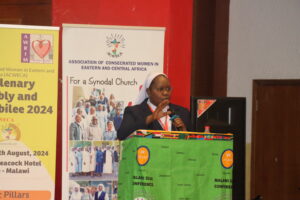The New Apostolic Nuncio to Kenya Promises to work closely with the AMECEA Bishops.

“I am here to serve you all.”
This was the message of the Apostolic Nuncio to Kenya, His Excellency Most Rev.
Charles Daniel Balvo to a group of 30 AMECEA bishops he met in Nairobi.
Speaking at a training workshop organized by AMECEA in collaboration with the
United States Conference of Catholic Bishops (USCCB), the nuncio expressed his
willingness to support and work with AMECEA bishops at all time.
This was the message of the Apostolic Nuncio to Kenya, His Excellency Most Rev.
Charles Daniel Balvo to a group of 30 AMECEA bishops he met in Nairobi.
Speaking at a training workshop organized by AMECEA in collaboration with the
United States Conference of Catholic Bishops (USCCB), the nuncio expressed his
willingness to support and work with AMECEA bishops at all time.
Most Rev. Balvo was appointed nuncio
to Kenya in on 17 January 2013 and arrived in the country on 12 April 2013.
Previously he served as apostolic nuncio to New Zealand, Cook
Islands, Fiji, Marshall Islands, Kiribati, Nauru, Palau, Samoa, Federated
States of Micronesia, Tonga, Vanuatu and as apostolic delegate to
the Pacific Ocean region.
to Kenya in on 17 January 2013 and arrived in the country on 12 April 2013.
Previously he served as apostolic nuncio to New Zealand, Cook
Islands, Fiji, Marshall Islands, Kiribati, Nauru, Palau, Samoa, Federated
States of Micronesia, Tonga, Vanuatu and as apostolic delegate to
the Pacific Ocean region.
Addressing the AMECEA bishops who
were who were in Nairobi for a week-long training on leadership management, the
nuncio expressed his gratefulness at having the opportunity to be with a
section of the AMECEA bishops. “Though I am a nuncio to only one of the AMECEA
countries, I am here at the service of all of you,” he assured the bishops. “We
have a real challenge to present the truth of the Gospel. Therefore we all need
the support of one another; praying for one another and for the Holy Father,”
he added.
were who were in Nairobi for a week-long training on leadership management, the
nuncio expressed his gratefulness at having the opportunity to be with a
section of the AMECEA bishops. “Though I am a nuncio to only one of the AMECEA
countries, I am here at the service of all of you,” he assured the bishops. “We
have a real challenge to present the truth of the Gospel. Therefore we all need
the support of one another; praying for one another and for the Holy Father,”
he added.
The workshop was part of the implementation process of the
AMECEA/USCCB capacity building project, which started last year. This was the
second group of the AMECEA bishops to receive the training; the first group was
trained in May 2012.
AMECEA/USCCB capacity building project, which started last year. This was the
second group of the AMECEA bishops to receive the training; the first group was
trained in May 2012.
Just like with the previous group
the following topics were covered:
the following topics were covered:
·
Meaning and Importance of Strategic Pastoral
Planning in the Church
Meaning and Importance of Strategic Pastoral
Planning in the Church
·
Investments
Investments
·
Strategic Pastoral Planning Process, Monitoring
and Evaluation
Strategic Pastoral Planning Process, Monitoring
and Evaluation
·
Integral Human Development
Integral Human Development
·
Leadership in the Church Institutions
Leadership in the Church Institutions
·
Social Pastoral Communications
Social Pastoral Communications
Other groups
which will be considered later for the same training include diocesan
secretaries, chancellors and development coordinators, together with national
secretaries general, heads of Catholic universities and institutes of higher
learning within AMECEA region, staff of national secretariats, priests, laity
and religious men and women who are involved in different levels of leadership.
which will be considered later for the same training include diocesan
secretaries, chancellors and development coordinators, together with national
secretaries general, heads of Catholic universities and institutes of higher
learning within AMECEA region, staff of national secretariats, priests, laity
and religious men and women who are involved in different levels of leadership.
SOURCE: AMECEA Social Communications Office



